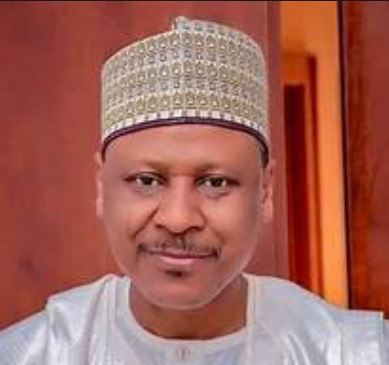
The Minister of Information and National Orientation, Mohammed Idris, has dismissed reports credited to him that by 203, the number of governors of the All Progressives Congress, APC, in the country would be 30, leaving the remaining six to opposition parties.
Idris, who spokes at the Progrssives Governors’ Summit for commissioners of information for APC-controlled states in Madiguri, Borno State, last week, also charged the commissioners to recognise the role of information management, especially at a time information was being used as a weapon again st the country.
The minister as spokesman of the federal government, he couldn’t have made such a statement, adding that the statement was made the National Chairman of APC, Prof. Yilwatda Nentawe.
On his charge to the commissioners, the minister said: ”Distinguished commissioners of information, colleagues in national service, I want to recognise your pivotal role in information management and dissemination.
”In an era where information is both a tool of development and a weapon of conflict, you are the architects of public understanding and the first line of defense for our nation’s integrity. We meet at a critical juncture, where the global information space is being weaponised against our nation.
”We are now confronting a deliberate and malicious campaign to falsely label Nigeria a ‘genocide destination.’ This is not mere misinformation; it is a coordinated disinformation operation designed to incite panic, fracture national unity, damage our international standing, and scare away the investment we so urgently need. Your role has never been more vital.
”Our first strategic imperative, therefore, is to disarm and dislodge this corrosive narrative. We must refuse to amplify the terminology of our detractors. Instead, our messaging must be proactive, grounded in verifiable facts, and focused on the reality of our ongoing efforts toward security, stability, and national cohesion.
”This moment demands that we reinforce our strategic counter-voice, systematically deconstructing these dangerous falsehoods with data, expert testimony, and powerful narratives of community resilience and inter-ethnic cooperation.
”We must demystify naysayers and reassure the public by repurposing complex government initiatives into accessible proof points of our commitment to unity and security. Furthermore, we must forge a united information front, partnering with governors, community leaders, traditional rulers, and civil society to create a chorus of credible voices that collectively refute this false narrative and affirm our shared identity.
”To do this effectively, we must master the digital battlefield. The upcoming UNESCO Media and Information Literacy Institute in Abuja is a national priority. It will equip your teams to forensically debunk falsehoods, trace malicious campaigns, and saturate the digital space with credible, engaging content that reclaims our national story.
”Central to this effort is the National Values Charter, a critical agent of change and national reorientation that will soon be unveiled by President Tinubu.
”The Charter, a creation of the National Orientation Agency, NOA, one of eight agencies under the Federal Ministry of Information and National Orientation, is structured to infuse patriotism, protect the country and citizens, and unify around one indivisible country.
”The National Values Charter will undeniably be the most potent counter-narrative to negative foreign mischaracterisation of Nigeria. The Charter defines who we are: a people committed to unity in diversity, resilience, and mutual respect. I charge us to make this Charter the foundation of all state-level communication, using it to actively promote a narrative of shared identity that renders divisive labels meaningless.”
Speaking on the achievement of President Bola Tinubu’s government thus far, he said: ”We must proclaim the great performance of the APC administration under President Bola Ahmed Tinubu, a reformer second-to-none, who is gradually leading us towards economic efficiency, translating policies into measurable impact, in relation to industrialisation, infrastructure, competitiveness, inclusion, sustainable institutions, and unlocking investment.
”In other words, we are talking about the Renewed Hope Agenda, which first started with the emphatic removal of the rentier oil subsidy and the floatation of the naira.
”President Tinubu’s near-term vision is to take Nigeria into the trillion-dollar economic club. In the process, our efficient handling of the fiscal and monetary policies has allowed us to settle crucial external debts, grow our non-oil exports, and post a positive trade balance, as well as keep a most impressive external reserve above $42 billion, being the highest in more than six years.
”Our fast-growing GDP, at 4.23% in the second quarter of 2025, suggests progress that we must be proud of. The Tinubu administration is ticking the boxes in revenue generation, infrastructure, agriculture, health, solid minerals, education, housing, and the fight against insecurity.
”There’s more federal allocation to the subnational governments for their ease of human and capital development. More than 600,000 students of tertiary institutions are benefiting from a rancour-free student loan scheme across Nigerian universities, polytechnics, and colleges of education.
”A federal ministry for regional development is in place, with five newly created regional development commissions. In addition, a Ministry of Livestock Development has been created to lead the way in harnessing the potential of the livestock industry.
”The Nigerian Consumer Credit Corporation, CREDICORP, is actively democratising access to consumer credit. All this, we must please tell, and say it loudly. To boost agriculture, President Tinubu has increased the capital base of the Bank of Agriculture to N1.5 trillion, the highest ever.
”The fiscal authority of local government areas, based on the pronouncement of Nigeria’s Supreme Court, is expected to reawaken economic activities and enhance security at the grassroots. A positive energy transition process is taking place that embraces CNG, hydropower, solar, diesel, and PMS, and other forms of green solutions.
”So far, this government has achieved an all-time high-power generation of 5,801 megawatts in March 2025. A national grid decentralisation is next.”
The post I never said APC’ll have 30 states in Nigeria by 2030 – Information Minister, Idris appeared first on Vanguard News.